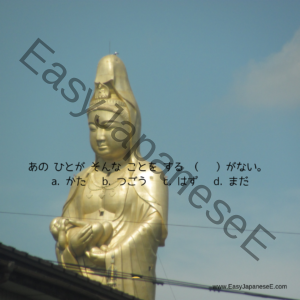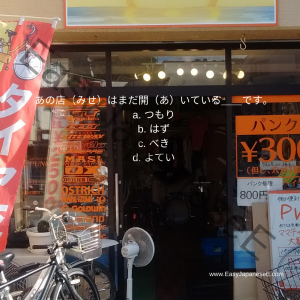
Today’s Question
父は東京に行ったはずだ。
How likely is my father to be in Tokyo now?
Today’s Grammar Point: ~たはず
~はず is used to describe a natural consequence (is supposed to, should) or a plan (is scheduled to) but when はず is used with a たform verb (past plain form), it often describes an action which should have taken place but actually didn’t and ~たはず implies the speaker’s surprise or regret. ~たはず can also be used when the speaker is making a guess on somebody else’s action in the past which the speaker does not know for sure if it actually happened or not.
Connections
- [たform verb] + はず(だ/です)
たform verb is the past plain form of a verb
Examples
鍵をここにおいたはずなのに、見当たらない。
I should have put the key here, but I can’t find it.もう支払ったはずだ。
I should have already paid.おじいちゃんなら昨日のうちにうちに帰ったはずだ。
My grandpa should have returned home within yesterday.もっと勉強すれば合格できたはずだ。
I should have passed if I had studied more.それはやっちゃダメって言ったはずだよ。
I think I told you that you shouldn’t do that.宿題をやったはずなのに、ノートが 見当たらない。
I should have done my homework, but I can’t find my notebook.この映画は見たはずだけど、どうなったか覚えていない。
I should have seen this movie, but I don’t remember what happened.その本は買ったはずだけど、 見当たらない。
I should have bought the book, but I can’t find it.父は東京に行ったはずだ。(Today’s Caption)
I thought my father had gone to Tokyo.メモを書いたはずなのに、 覚えていない。
I should have made a note about it, but I don’t remember.
Answer to Today’s Question: Not sure.
The speaker thinks his father went to Tokyo but the speaker doesn’t have the way to confirm it.
If you liked this article, please share it with your friends using the social media buttons below. Also, your clicks on ads on this page help covering the cost of running this website. Your support will be much appreciated.




